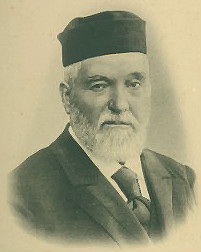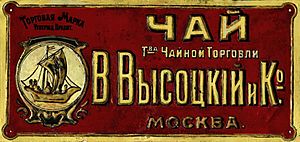Wissotzky Tea facts for kids
 |
|
|
Native name
|
תה ויסוצקי
|
|---|---|
| Tea Company | |
| Founded | Moscow, Russia 1849 |
| Founder | Kalman Zev (Kalonimus Wolf) Wissotzky |
| Headquarters | , |
Wissotzky Tea (Hebrew: תה ויסוצקי) is a global tea company. It is owned by a family and is based in Israel. The company also has offices in London and the United States. It is the top tea seller in Israel.
Wissotzky Tea started in 1849 in Moscow, Russia. It grew to be the biggest tea company in the Russian Empire. By the early 1900s, it was the largest tea maker in the world. It is one of the oldest tea companies still around today.
The company is led by Shalom Seidler. He is a relative of Shimon Zeidler. Shimon Zeidler started the company's Middle East branch in 1936. Wissotzky Tea's main office is in Tel Aviv. Its tea is made at a factory in the Galilee region. About 400 people work for the company.
Wissotzky Tea sells most of the tea in Israel. It also sends its products all over the world. You can find Wissotzky Tea in Canada, the UK, Australia, Japan, South Korea, Europe, Hungary, Russia, Ukraine, and the US. In the US, they sell special "silky pyramid sachets." These sachets hold whole loose leaf tea, fruits, and herbs.
Meet the Founder: Kalman Ze'ev Wissotzky
Kalman Ze'ev Wissotzky was born on July 8, 1824. His birthplace was Starye Zagare in the Russian Empire. This area is now called Žagarė in northern Lithuania. He grew up in a Jewish family.
Kalman had a traditional Jewish education. At 18, he married Keyla Zivya Abramson. With help from his wife's family, he studied for three years. He even spent time at the famous Volozhin Yeshiva. He also learned from Israel Salanter. Kalman was a very religious person his whole life.
As a young man, he joined a group called the Lovers of Zion. This group supported Jewish settlement in the Land of Israel. Kalman, his wife's family, and 18 other Jewish families started a farm together. It was about 32 kilometers from Dvinsk (now Daugavpils in Latvia).
Later, Kalman moved to Moscow. He worked for Pyotr Kononovich Botkin, a tea trader. Kalman started by selling tea door to door. He eventually became a tea trader himself. In Moscow, he used a Russian name, Vasily Yakovlevich. After Botkin passed away, Kalman started his own tea business in Moscow around 1858. This was the start of Wissotzky Tea.
Kalman's Support for Others
Kalman Wissotzky used his wealth to help many people and projects:
- He helped fund a Jewish school in Jaffa.
- He was a big supporter of the Jewish National Fund. This group helped buy land in Israel for Jewish people.
- He helped start a Hebrew-language newspaper called Hashiloah. Ahad Ha'am, a famous writer, managed Wissotzky's offices and edited this paper.
- In 1908, after he passed away, his family gave a lot of money. This money helped build what is now the Technion-Israel Institute of Technology. It is a major university in Israel.
In 1885, Kalman Wissotzky visited the Land of Israel. He spent three months touring the area. Kalman and his wife Keyla had four children. They had three daughters and a son named David.
Wissotzky Tea: A Journey Through Time
The 1800s: A Tea King Rises
In 1885, Kalonymus Zev Wissotzky visited the Holy Land. He even wrote a book about his trip. By this time, Wissotzky was a very rich and powerful man. People called him "the Russian king of tea."
He was a key figure in the Hovevei Zion movement. This group supported the idea of Jewish people returning to their ancient homeland. In 1885, the movement sent him to what is now Israel. They wanted him to help solve a disagreement. The argument was about how to use money sent from Jewish communities around the world. Some wanted to build new Jewish towns. Others wanted to support the existing Jewish communities. Wissotzky's job was to find a solution that made everyone happy.
Wissotzky Tea quickly became popular. People all over the Russian Empire loved it.
The 1900s: Global Growth and Changes
Early 1900s: Expanding Worldwide
By 1904, Wissotzky Tea was selling its products in many new places. These included Germany, France, New York, and Canada. In 1907, the company started the Anglo-Asiatic company in London. This office was managed by Ahad Ha'am, a well-known Jewish writer. The company also bought tea farms in India and Ceylon (now Sri Lanka).
From the early 1900s until 1917, Wissotzky Tea Company was the biggest tea company in the world. After the October Revolution in 1917, the Russian government took over all private businesses. It took two years for the government to take over Wissotzky Tea. This was because the company offered many benefits to its workers.
In 1917, the company slowly stopped its work in Russia. The Wissotzky family moved to the United States and Western Europe. They opened new branches in places like Italy and Gdańsk, Poland.
1920s and 1930s: New Headquarters and Challenges
After the Russian Revolution, Wissotzky Tea's main activities moved to London. Boris Lourie managed the London office. Another important location was Gdańsk, Poland. Alexander Chmerling and Solomon Seidler, a tea expert and part of the Wissotzky family, ran the Gdańsk operations. Many people had left Russia, and the Polish factory helped meet the demand for the tea they were used to.
In 1936, Simon Seidler, Solomon's son, felt that war was coming. He left Poland and moved to Palestine. Sadly, many family members were lost during the Holocaust. The company also lost its businesses in Europe.
In 1936, Simon Seidler set up a Wissotzky center in the Middle East. He started selling tea to British soldiers in Mandatory Palestine. This helped make the brand famous. Simon built a place to pack the tea and slowly added more products. In 1957, Simon Seidler passed away. His wife, Ida Seidler, took over the family tea business. Ida brought new ideas to how the tea was made and sold.
The 2000s: Growing the Wissotzky Group
In the 21st century, Wissotzky Tea Company grew even more. It bought Zeta Olive Oil, a top olive oil company in the Galilee. It also bought Lahmi, a leading baked goods company in Israel. Lahmi has an international brand called Elsastory.
In December 2012, these three companies joined together. They formed the Wissotzky Group. This group focuses on gourmet foods and special treats.
See also
- Economy of Israel
- Israeli cuisine
- Russian tea culture
|
 | Leon Lynch |
 | Milton P. Webster |
 | Ferdinand Smith |



